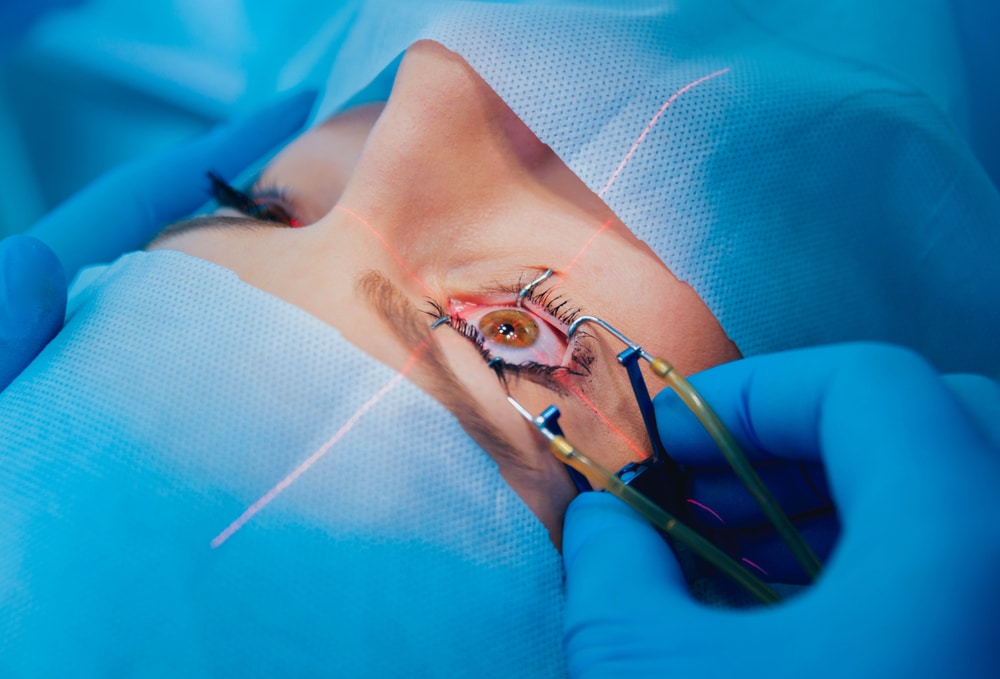Medically Reviewed by: Yasir Ahmed, M.D.
Is Corneal Transplant Surgery Painful?
If you’re considering a corneal transplant, you may be wondering, is corneal transplant surgery painful? Are you awake for a corneal transplant? And, how long does it take to recover from a corneal transplant?
Before the procedure, your doctor will offer you either local or general anesthesia depending on your comfortability with the procedure. During the procedure, you will not be able to feel any pain but you may experience some slight discomfort during recovery.
Eye Center of Texas is a premier eye care practice with several locations throughout Texas. In this article, our cataract surgeons are going to walk you through what type of pain to expect during the procedure and throughout your recovery.
Are cornea transplants painful?
The cornea transplant procedure itself is not painful. Your surgeon will use a local anesthetic to numb your eye and may give you general anesthesia or a sedative if you’re feeling anxious about the transplant. Even if you choose to be left awake for the procedure, the anesthesia will generally prevent you from feeling any pain.
You may feel discomfort for the next couple of days following the procedure but you shouldn’t experience any severe pain. If you do, please don’t hesitate to call your surgeon. They’ll be able to check for any infections and can give you advice on how to help mitigate the pain.
What is a cornea transplant?
Your cornea is the clear layer of tissue on the outside of your eye that filters light and helps you see clearly. If it gets damaged or is diseased, your surgeon can remove the damaged part of the cornea and replace it with donated cornea tissue through a procedure called a cornea transplant, or keratoplasty. There are various types of corneal transplant options including partial cornea transplant and full-thickness corneal transplant.
What is the success rate of a corneal transplant?
The success rate of the transplanted cornea is 91% in the first year. Most patients will experience clear vision in anywhere from a week to a year, depending on the patient and their unique healing process. Common causes for lesser outcomes can include organ rejection, glaucoma, or retina problems.
Why would someone need a cornea transplant?
Why would someone need a cornea transplant? You may need a cornea transplant if you’ve experienced the following eye problems:
- Corneal swelling
- Cornea scarring
- Scratched cornea
- Thinning, clouding, or swelling of the cornea
- Keratoconus
- Fuchs’ dystrophy
- Infections
If you aren’t sure whether or not you’re a good candidate for a cornea transplant, schedule an appointment with your doctor. They can help recommend the right treatment for your needs.
How long does it take to recover from a corneal transplant?
Full recovery time from a corneal transplant is dependent on the individual. Generally speaking, it can take up to a year to fully recover from a corneal transplant. However, most people are back to their normal routines within one to two weeks with the exception of heavy lifting. It’s advised to wait at least four weeks before doing any heavy lifting, or longer if your doctor advises it.
Please keep in mind that cornea transplants do not necessarily restore full vision and you may still need corrective devices like glasses or contact lenses after the procedure. That said, there are several corrective procedures that you can ask your surgeon about following a corneal transplant. For instance, you may be a good LASIK eye surgery candidate, can consider PRK, or ask about Visian Toric ICL.
Eye Center of Texas offers corneal transplants in locations throughout Texas
To answer the question, is corneal transplant surgery painful? Neither the procedure itself nor the recovery should cause patients any serious pain.
If you have any questions about anesthesia options for the procedure, recovery, or success rates, Eye Center of Texas is here for you. We have decades of combined experience treating eye diseases and vision issues with the safest and most advanced surgical techniques.
To learn more about corneal transplant surgery, contact us today at 713-797-1010 or request an appointment online.
More Helpful Articles by Eye Center of Texas:
- Who is a Candidate for Corneal Transplant?
- Cornea Transplant Recovery in Houston: A Guide
- What Causes Eye Flashes and Floaters?
- Laser Treatment for Eye Floaters Relief
- Can You Reverse Presbyopia?
Related Articles
Financing Options Available
Apply today to find a financing option that meets your needs.
Our Locations
Houston/Bellaire
6565 W. Loop S., Suite 650Bellaire, TX 77401
Medical Office:
713-797-1010
Medical Fax:
713-357-7276
LASIK/Near Vision:
Office: 713-395-1515
Fax: 713-357-7278
Pasadena
4415 Crenshaw RoadPasadena, TX 77504
Medical Office:
281-977-8800
Medical Fax:
281-977-8877
Sugar Land
15200 S.W. Freeway, Suite 130Sugar Land, TX 77478
Medical Office:
281-277-1010
Medical Fax:
281-277-4504
Clear Lake
455 E. Medical Center Blvd., Suite 110Webster, TX 77598
Medical Office:
281-332-1397
Medical Fax:
281-282-9152
Katy
Greenhouse Medical Plaza2051 Greenhouse Road, Suite 110
Houston, TX 77084
Medical Office:
346-547-7070
Medical Fax:
281-214-2971
The Woodlands/Conroe
100 Medical Center Blvd., Suite 118Conroe, TX 77304
Medical Office:
936-647-1610
Medical Fax:
936-647-1620


